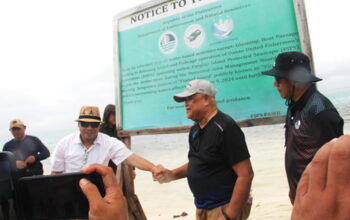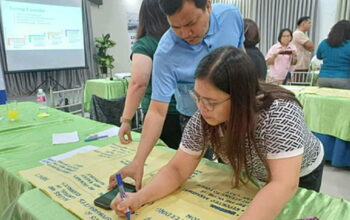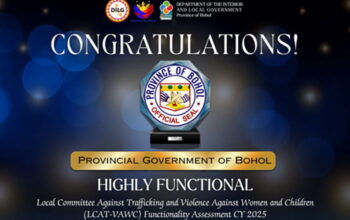
AS a measure to harmonize the duration of rehabilitation of persons who use drugs (PWUD) based on their affectation based on the locally crafted ordinance and the recent Regional manual to guide the implementation of the community based drug rehabilitation program, the provincial legislative under Vice Governor Dionisio Victor Balite is poised to introduce the necessary amendments.
It may be recalled that Bohol Sangguniang Panlalawigan in 2017, enacted Provincial Ordinance No 2007-004, which adopts the Community-based drug rehabilitation program Without-walls (CBRP-WoW).
Well, the move was to provide a comprehensive drug rehabilitation program aimed at providing holistic approach for drug users to save them from wasting their lives, through therapeutic methods, while redeveloping their physical, emotional, psychological, social, economic and spiritual strengths on their way to the mainstream, explained Vice Governor Balite.
The ultimate motive is to achieve a “Drug Free Community or Family” through proper evaluation and determination by appropriate government agencies and stakeholders, based on the ordinance preamble.
Putting the preservation of life as the anchor of the program, CBRP-WoW allows the person who use drugs, be they deeply dependent or a first user, the chance to change through and steer his life away from dangers, and surviving on the support of the family, community, to work together to hand-hold the person back to the mainstream.
Back then in 2017, Bohol’s CBRP WoW, specifically its section 4 which talks of the duration of the program lays down two rehabilitation durations: 3 months program for those assessed as low-risk drug users, not violent and of sound mind; and 5 months program for those assessed as moderate-risk and of sound mind.
The more serious cases would have to be placed under a medical institution for a more intense rehabilitation program.
Recently however, the Department of Health, Central Visayas Center for Health Development, Region VII saw the need to bridge the gap between the knowledge of the nature of drug use and drug dependence and the implementation of the various approaches needed to be done in the various levels of care.
With this, the CHD in Region 7 issued a regional Guidance Manual on CBRP for PWUDs (PWUDs) in Central Visayas to address issues and concerns on provision of services especially at the community level where a greater percentage of those affected needs primary health care.
Instead of the simplified classification and duration of the rehabilitation, and based on the need to fit the ordinance to the regional manual, SP in Bohol, with the sponsorship of Board Member Tomas Abapo, proposes to amend the section to accommodate the general intervention program for PWUDs.
And in line with the regional manual, Bohol proposes to put up a 1 month rehabilitation program for “Low-Risk” PWUDs or those having “mild substance disorder” and for those who voluntarily gave themselves up to authorities. The sessions however would depend also on the way the PWUD is coping and may be extended based on the individual performance.
These would be in eight 8 sessions with PNP personnel who graduated from the Training of Trainors (TOT) for CBRP either as Interventionists and Facilitators.
And then, there is a 4-month program intended for “Moderate Risk” where sessions run to 4 months, conducted in 20 sessions.
The ordinance, when passed in its amended form, would now have a provision for CBRP for those who have been apprehended and mandated by the courts to undergo rehabilitation.
It says that a 6-month program would be implemented for court mandated PWUDs who have Mild Substance Dependency after undergoing a Drug Dependency Examination (DDE), and this would have sessions longer than 6 months.
Such is so because the first 4 months would be the General Intervention and Community-Based Treatment and the remaining months will focus on the Social Support Group Sessions, with an over-all sessions numbering 28.
With this, the SP is expected to pass the amended version to align its CBRP to that of the programs of the national government on the way to attaining a “Drug-free Philippines.”
All of those who would be classified under which category, would be based on the screening result of the Alcohol, Smoking and Substance Involvement Screening Tool – Brief Intervention (ASSIST – BI) or the Drug Dependency Examination (DDE) to be administered by an accredited duly trained medical professional in the Rural Health Unit (RHU). (rahc/PIA-7/Bohol)



